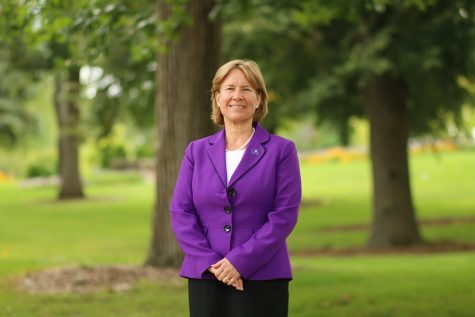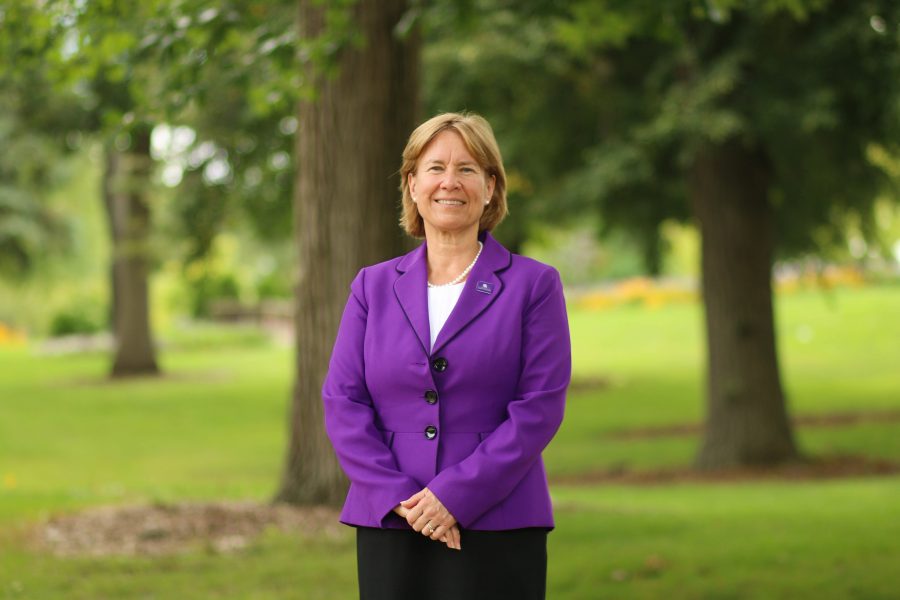365(-ish) days later
Beverly Kopper, who became UW-Whitewater’s 16th Chancellor last summer, has seen both highs and lows for the university in the past year. photo by Kimberly Wethal
October 7, 2016
It’s been over a year since Chancellor Beverly Kopper packed up all of her office, only to move down the hall into the chancellor’s suite left vacant by chancellor emeritus Richard Telfer’s retirement. In an interview with the Royal Purple, Kopper reflects on how both she and the university have changed in that time.
Royal Purple: If you had to summarize the past year into just a word or a phrase, what would it have to be?
Beverly Kopper: Passion. I talked about this this morning [at the State of the University address] – that one of the great joys of being at this university, and certainly being the chancellor, is just seeing the passion that faculty, staff and students have for this university. It really does make it a very, very special place to be at, and it is. It’s that passion for the university, for our mission, for our students, for each other, making a difference in our communities … that really I think sums it up.
RP: What have been some of your best moments over the past year?
BK: There are so many … it’s going to be hard to pick out, it really is. Any time I’m with students – that’s why I went into this business, that’s why we’re all here to really make a difference. Last week I met with our Campus Assistants, and we had this great discussion about the university and budget cuts and a vision and where we’re going, and of course they all had wonderful questions. So that’s always fun. Last spring, as I mentioned in my State of the University, we had some very difficult discussions on campus about our campus culture. When I walked into the action forum and saw 450, maybe more, individuals – faculty, staff and students there – I was touched, and I think it shows the dedication of everyone. Then watching faculty, staff and students come together to talk about these issues and move the university forward, as we want it to be a place that is welcome to everyone – I was very touched by that.
RP: In addition to good moments, UW-Whitewater has also had its

photo by Kimberly Wethal
share of not-so-good moments: lawsuits, Title IX complaints, action forums fueled by racial tensions and budget cuts. How did you work through all of these incidents? How do you not take it home at night?
BK: I admit sometimes I do. It goes back to knowing that part of the DNA of this university is always, always wanting to better and always wanting to improve. Again, that part of our value here – part of what this university is and does – is making sure that it’s a wonderful and safe environment for everyone, that we make sure it’s a welcoming environment for everyone. So I know that throughout this university, there are many, many folks who are dedicated to that, and dedicated to making sure that’s the experience of our students. I think about that a lot.
RP: With all of those things, how do you stay positive and keep looking forward?
BK: Oh, it’s really easy – I mean, that’s one of the easiest parts of my job, is to stay positive, because all I have to do is look around and spend time with students, spend time with faculty, spend time with staff, because again, there’s a very, very special sense of family here, and a very special sense of wanting to do the right thing and make a difference. You just feel it. It’s easy to stay positive in that environment. It’s always there. That’s one of the things that drew me to this university, was its mission and its values, and that passion and that sense of family. I think that’s one of the things that’s a hallmark of this university.
RP: How would you say the campus is different for students and faculty in general in the past 365 days from when you took your post as chancellor?
BK: We talked about it this morning [at the State of the University] – we’ve been through a lot this year. And we honored this morning colleagues that we’ve lost. We had some very difficult conversations again with campus culture, but the work that faculty and students are doing together as part of the Campus Culture Working Group is wonderful and really moving us forward. And then we experienced some things out of our control, like the budget cuts. Like the changes in policy to tenure that we’re concerned about. Like I said this morning, tenure is alive and well on this campus. We’ve managed the budget cuts in a way that I’m very proud of. We remained laser-focused on student success as well as the other thing I’m very proud of, which is some of our sister institutions have had to lay off employees. We did none of that, and I’m very proud of that. It goes back to really working for that sense of family.
RP: How do you feel you’ve changed in the past 365 days?
BK: When you’re the provost, obviously you’re the chief academic officer, and in many instances in this university, you serve as the chief operating officer. So for me, now being chancellor, I’ve gotten to see more of the external picture. I spend more time with legislators out in the community speaking to different business organizations and spending time with our alumni and donors and our corporate partners. So I’ve learned more about more of the external side. Now don’t get me wrong, I still peer over the university and love, love, love being on campus, but as chancellor, you do have responsibilities that take you away from campus.
RP: What are you looking forward to in the next 365 days?
BK: I’m looking forward with everyone – faculty, staff and students – leading this wonderful university. That we continue to stay laser-focused on student success, that we continue our sense of family. Those things are all really, really important. And that together, we continue to weather the changes in budget and that we continue to talk about our campus culture issues. That’s very important.
—Kimberly Wethal













